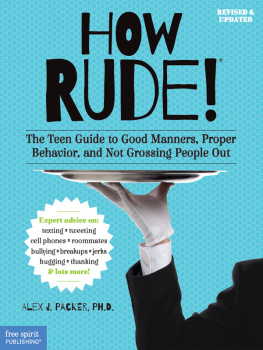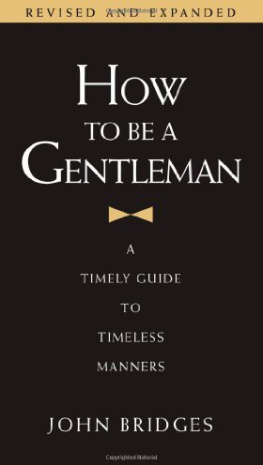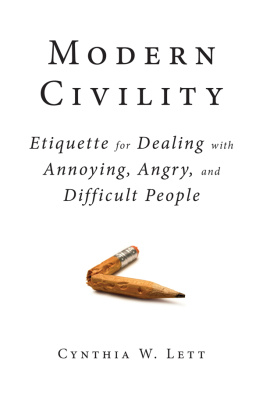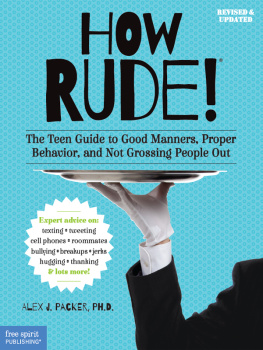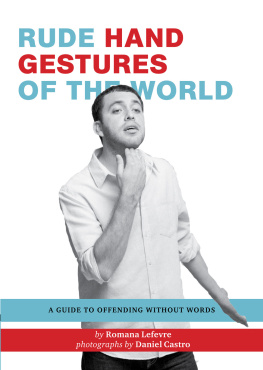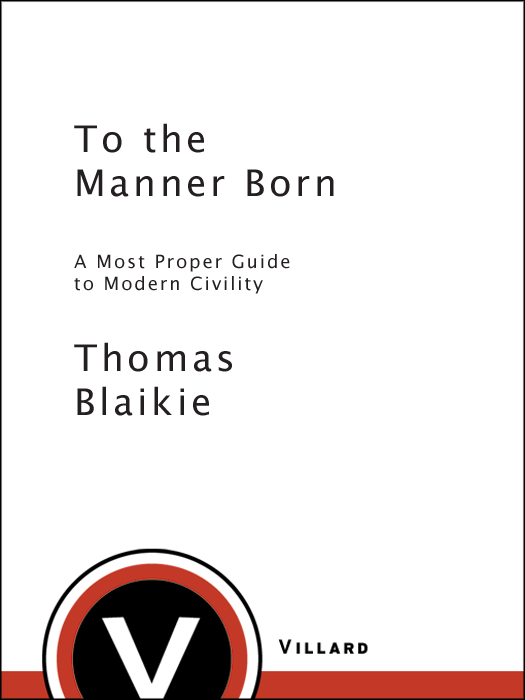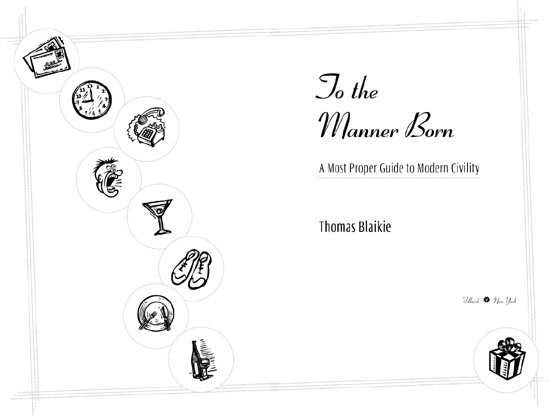Also by Thomas Blaikie
You Look Awfully Like the Queen: Wit and Wisdom
from the House of Windsor
A Villard Books Trade Paperback Original
Copyright 2005 by Thomas Blaikie
All rights reserved.
Published in the United States by Villard Books, an imprint of The Random House Publishing Group, a division of Random
House, Inc., New York.
VILLARD and V CIRCLED Design are registered trademarks of Random House, Inc.
Originally published in hardcover in the United Kingdom by Fourth Estate, an imprint of HarperCollins Publishers, in 2005.
The quote by Evelyn Waugh on is from A Handful of Dust
by Evelyn Waugh, published by Little, Brown and Company.
eISBN: 978-0-307-79232-7
www.villard.com
v3.1
To my mother,
whose manners are a miracle
Contents
Lets Get Together:
Inviting and Accepting Manners
Returning-Hospitality Manners:
Also, the Problem of Richer Friends
Staff Manners
Mainly for Customers and Employer
Introduction
So , I can see you standing there, shaking your head and saying to yourself, this Brit thinks he can tell us how to behave, does he? Well see about that!
I might as well put my foot in it straight away. When I was ten, I went on a cruise along the coast of Norway with my family. There was an American lady on board who had what my mother described as sharp elbows, which means she was good at pushing people out of the way. One day this person said to my mother rather menacingly, Is that your boy? Yes, my mother replied in that cool British manner designed to conceal alarm, in this case justified because the lady positively snapped: You ought to get something done about his teeth.
Now, I know you would never say anything like that, would you? But the trouble is, in Britain, well we know that you Americans are terribly friendly and chat to people at bus stops and in hotel lobbies, and youre not haughty and uncommunicative, expecting everybody to curtsy to you like us, but sometimes we really do think you go just a bit too far.
Ive really upset you now. So before I go any further in suggesting that British diffidence and modesty might actually be virtues, Id better start backpedaling furiously. Because the other main thing I want to say is that, as far as manners are concerned, Britain and America are in the same boat in so many respects. Like us, youre getting very steamed up right now about manners in public. Large numbers of you are telling researchers that in shopping malls, on the sidewalk, in public places generally, people are behaving more and more as if nobody else were therebawling into cell phones, pushing past without so much as a glance, not even noticing if someone holds a door open for them. And as for the kidswhether theyve got adults with them or not, theyre awful!
You, like us, are in this state of affairs for similar reasons. In both countries, after World War II manners suddenly looked stuffy, old-fashioned, and sexistholding doors open for ladies, children not to speak unless spoken to, and so on. A lot of people said, Lets not bother with them. Then came the sixties, and it was Let it all hang out. Lets all be individual and creative. Lets not have any rules.
Which goes some way to explaining todays anarchy in Britain and America. Quentin Crisp, in his strange and original meditation on manners, Manners from Heaven, tells of a New York mother who, adopting that 1960s thinking, decided that teaching her children manners would stifle them. The result was that she had to take her meals alone in her bedroom, so atrocious were the scenes at the dinner table.
For nearly fifty years, weve both been living in a manners vacuum. Of course, through all that time weve been yearning for manners, weve been wondering what became of them. But all this progressive thinking has undermined our confidence. Were not sure which manners are the right ones, were not even sure if weve got the right to stand up for the manners we do think are the right ones. A perfect American example of this confusion occurred in the 1990s, when some friends of mine were the only English people traveling on a bus from the Hamptons to New York. A fellow passenger told them off for not keeping their children under control (knowing them, I can say there was probably some justification), but another person on board was outraged. Im ashamed for my country, he said of the complainer, and insisted on walking my friends all the way to the train station when they got to New York.
Who was right? What a dilemma!
To top it all, there is one final element that came onto the scene fairly late and really put manners out in the cold. You had Ronald Reagan, we had Mrs. Thatcher. Now youve got George W. Bush. We both had yuppies. For twenty years, at least, we have had a political and social culture that has put all the emphasis on individual achievement and success, on looking after number one, and hardly any on qualities of selflessness, modesty, and consideration for others.
But we should be grateful to this last development. After such a long time of too many people being pushy and go-getting, its no wonder weve all decided to try to be nicer to one another, no wonder there is this huge interest in manners on both sides of the Atlantic. Manners are making a comeback at last.
This book is a guide to modern manners. I say: Lets have manners based on common sense and reason; manners that bring people together rather than drive them apart; manners that make people feel comfortable and confident. So if a group of friends go out for the evening to a bar and one of them spends the whole time on a cell phone talking to someone else who isnt there, it doesnt make any sense. Why did that person bother coming along? Why didnt he or she just stay at home and avoid upsetting everybody?
To care about manners, you dont have to turn into a huffy, crabby type who either wants to turn the clock back to some fantasy Pleasantville version of the 1950s or thinks bad manners means the end of the world. Forget grandiose philosophical claims about the state of the universe. As I see it, there are certain specific problems, so lets do something about them. Lets be positive. Here I differ from certain of my British rivals in the manners field who seem to have sunk into terminal gloom and despair, the only answer being to stay at home and lock the door. Whats wrong with straightforward practical solutions? This business of loud cell phone conversations in public, for instancewhy dont people just speak more quietly, at a normal conversational level? Whats moreand here Im being decidedly un-Britishdont lets sit there seething inside and not daring to speak, lets actually try pointing out to these cell phone users that everyone else can hear them. In the nicest possible way, of course. Not a brusque Cut it out. More of a I hope you dont mind my mentioning it, but did you realize
I dont want manners to be a tyranny, either. We must avoid the old-fashioned one mistake and youre out approach. We have to give the benefit of the doubt: Someone might have meant well, even if the execution wasnt perfect. Now, might this just be a little harder for the American mentality to grasp? (Actually, I ought to drop this softly-softly approach, because secretly Im rather enjoying trying to boss you about.) After all, you do quite like everybody to join in and tend to be a bit hard on the nonconformists: Remember the witches of Salem and all that? On that same traumatic Norwegian cruise, I got into terrible trouble with the Americans on board for refusing to join in the ceremony for crossing the Arctic Circle, which involved having ice poured down your back.






